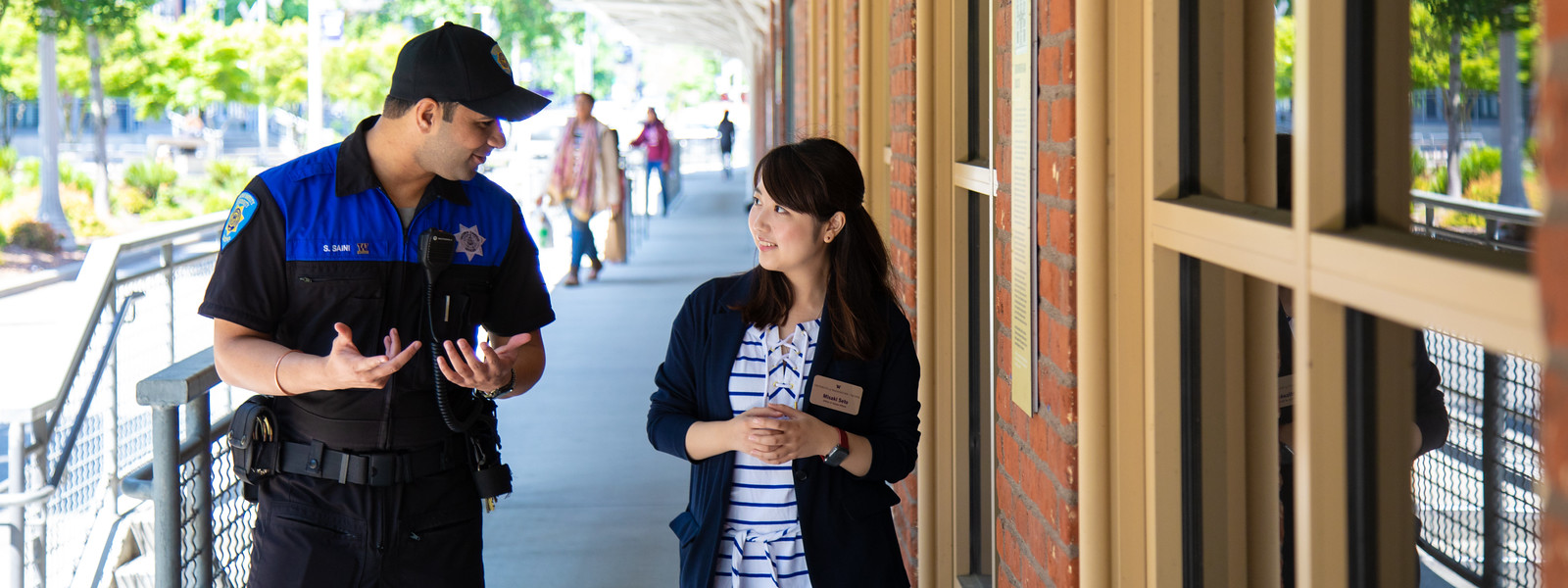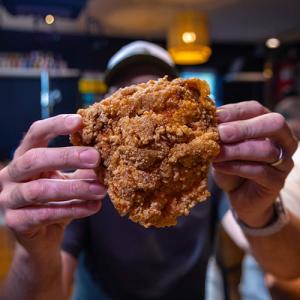
Misaki Seto: Jurassic Park Biologist
Misaki Seto, '19, Biomedical Sciences, is proof that the STEM influence of "Jurassic Park" extended beyond the shores of North America.
(Photo above: Misaki Seto works with UW Tacoma Campus Safety & Security on a program to help international students adjust to U.S. culture. Read our story: A Bridge Over Barriers.)
Misaki Seto made the decision to become a biologist after watching “Jurassic Park” as a child. “I saw Jurassic Park when I was really young, and loved the scene where they talk about making a dinosaur from lost genes,” she said. “Of course, I didn’t really know what they were talking about at the time but I thought if I studied biology I might be able to make dinosaurs one day too.”
Seto was born in Sapporo, Japan, the capital of the mountainous island of Hokkaido which is known for its beer and snowy ski slopes. As the time approached to start looking into higher education, Seto’s parents persuaded her to consider becoming a pharmacist. “My parents really wanted me to go to a pharmacy school, which is a six year program,” she said. “But after about a year in, I realized that I didn’t enjoy it, so I decided to leave and find something better suited for me.”
Biology came back into the picture. As Seto considered her options, she expanded her search to include the United States. “When I was looking into studying abroad, the agency I went through suggested Washington because there are a lot of colleges with good science based programs,” she said. “I started out at Tacoma Community College (TCC) to get my associate’s degree, and many of my teachers there suggested the University of Washington because of the cutting edge research and technology based in biology.”
“I decided to come to the United States because U.S universities have more options for higher education in science, and many Nobel Prize researchers in Japan graduated or studied in the U.S,” she said. “I was also interested in western culture and learning English so I thought studying in the U.S would be like ‘killing two birds with one stone’.”
— Misaki Seto
While Seto was originally interested in pursuing marine biology, her time at TCC aimed her towards biomedical sciences. “While at TCC I took an introductory course where we studied genes and infectious disease, and I found myself really intrigued,” she said. “My mom is a nurse, so hearing her talk about disease after having a medical understanding strengthened my interest. Now, health-science-based biology feels like a calling to me.” Driven to honor her inner child who wanted to be a biologist so long ago, Seto also feels a strong commitment to help others as much as she can. “It makes me want to work that much harder knowing that I can really help people with what I research; if I can help someone with my research, I’ll know I made a good choice in pursuing this career.”
It was a difficult choice between UW Seattle and UW Tacoma, but Seto had fallen in love with the Tacoma area after living here for two years. “I really like Tacoma, and enjoy the area. It’s quieter, and I feel comfortable here,” she said. “In Sapporo we get a lot of snow every year, but in Tacoma it’s not too cold and not too hot, it’s just right.”
A senior in the biomedical sciences program, Seto has been at UW Tacoma for the last two years. When she started here, she decided that she wanted to have a more involved academic career than she had at TCC. “When I was going to TCC, I was kind of just going to school and then coming home. I wasn’t involved in any school activities or clubs and it made me feel kind of lonely,” she said. “At UWT I’ve really put myself out there, and as a result I’ve found a group of really close friends that have been fundamental in supporting me and encouraging my success.”
Seto has been working on a capstone project focused on understanding malaria, and looking at a specific protein that might help in improving treatment. “In our research, we’ve been trying to identify this protein to understand how it invades a cell,” she said. “If we can figure that out, we might be that much closer to finding better treatments for this disease.”
Being busy with complex biomedical research isn’t enough for Seto. On campus, she’s involved in a host of clubs and projects with a focus on helping international students. “Right now I’m working at the Office of Global Affairs to assist international students with transitioning into UW Tacoma to make them aware of the resources available on campus,” she said. “Culture and norms in the United States can be very different from other countries, so it’s important for students to know that we are here for them, and they aren’t alone here.”
Seto is also the Vice President of the International Talks Club which she helped to start in 2018 along with UW Tacoma’s International Student Advisor, Amber Hallberg. Sponsored by the Global Affairs Office, the group works to organize events based on the needs of international students to help them thrive in a new environment. “Our events are meant to discuss how international students can meet people, address issues within their communities, and promote camaraderie across barriers,” said Seto. “Through the club, I also teach Japanese to bring awareness to my culture and those who share it on campus.” With her ability to speak and read Japanese, she’s been working with UW Tacoma Professor Lisa Hoffman and Associate Professor Mary Hanneman in their oral history project about Japanese and Japanese Americans in Tacoma. “It’s been so rewarding to help with uncovering the history of Japanese people in Tacoma who can now be more recognized for their contributions,” said Seto.
Following graduation, Seto plans to continue her lab work on malaria partnering with UW Tacoma through the Optional Practical Training program, which allows international students to engage in training related to their field of study. In the long term, her goal is to pursue a Ph.D. focused on biomedical sciences so she can continue to study infectious disease, potentially eradicating a few along the way. “I see a big future for myself, and I’m excited to get started on using what I’ve learned in school and applying it to the ‘real world’ of research and problem solving,” she said.



